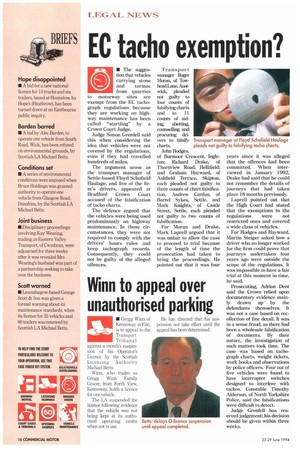EC tacho exemption?
Page 18

If you've noticed an error in this article please click here to report it so we can fix it.
• The suggestion that vehicles carrying stone and tarmac from quarries to motorway sites are exempt from the EC tachograph regulations because they are working on highway maintenance has been called "startling" by a Crown Court Judge.
Judge Simon Grenfell said this when considering the idea that vehicles were not covered by the regulations, even if they had travelled hundreds of miles.
The argument arose as the transport manager of Settle-based Floyd Schofield Haulage, and five of the firm's drivers, appeared at Bradford Crown Court accused of the falsification of tacho charts.
The defence argued that the vehicles were being used predominantly on highway maintenance. In those circumstances, they were not required to comply with the drivers' hours rules and keep tachograph records. Consequently, they could not be guilty of the alleged offences. Transport manager Roger Moran, of Towhead Lane, Austwick, pleaded not guilty to four counts of falsifying charts and to 11 counts of aiding, abetting, counselling and procuring drivers to falsify charts.
John Hodges, of Burmoor Crescent, Ingleton; Richard Drake, of Thornview Road, Hellifield; and Graham Hayward, of Ashfield Terrace, Skipton, each pleaded not guilty to three counts of chart falsification. Andrew Cardus, of Barrel Sykes, Settle, and Mark knights, of Castle Street, Settle, each pleaded not guilty to two counts of falsification.
For Moran and Drake, Mark Laprell argued that it was unfair to allow the case to proceed to trial because of the length of time the prosecution had taken to bring the proceedings. He pointed out that it was four years since it was alleged that the offences had been committed. When interviewed in January 1992, Drake had said that he could not remember the details of journeys that had taken place 18 months previously.
Laprell pointed out that the High Court had stated that the exemptions to the regulations were not restricted ones and covered a wide class of vehicles.
For Hodges and Hayward, Martin Steiger asked how a driver who no longer worked for the firm could prove that journeys undertaken four years ago were outside the scope of the regulations. It was impossible to have a fair trial at this moment in time, he said.
Prosecuting, Adrian Dent said the Crown relied upon documentary evidence mainly drawn up by the defendants themselves. It was not a case based on recollection of fine detail. It was in a sense fraud, as there had been a wholesale falsification of documents. By their nature, the investigation of such matters took time. The case was based on tachograph charts, weight tickets, work books and observations by police officers. Four out of five vehicles were found to have interrupter switches designed to interfere with tachos. Constable Timothy Alderson, of North Yorkshire Police, said the falsifications were difficult to detect.
Judge Grenfell has reserved judgement; his decision should be given within three weeks.
















































































































